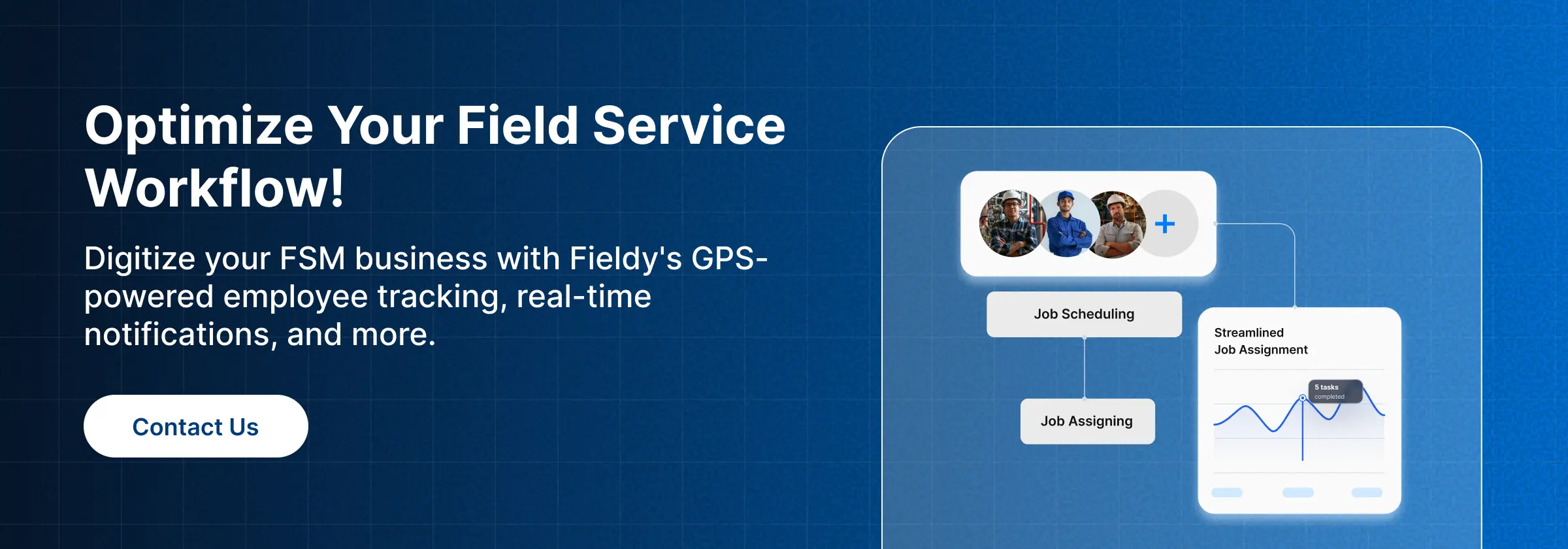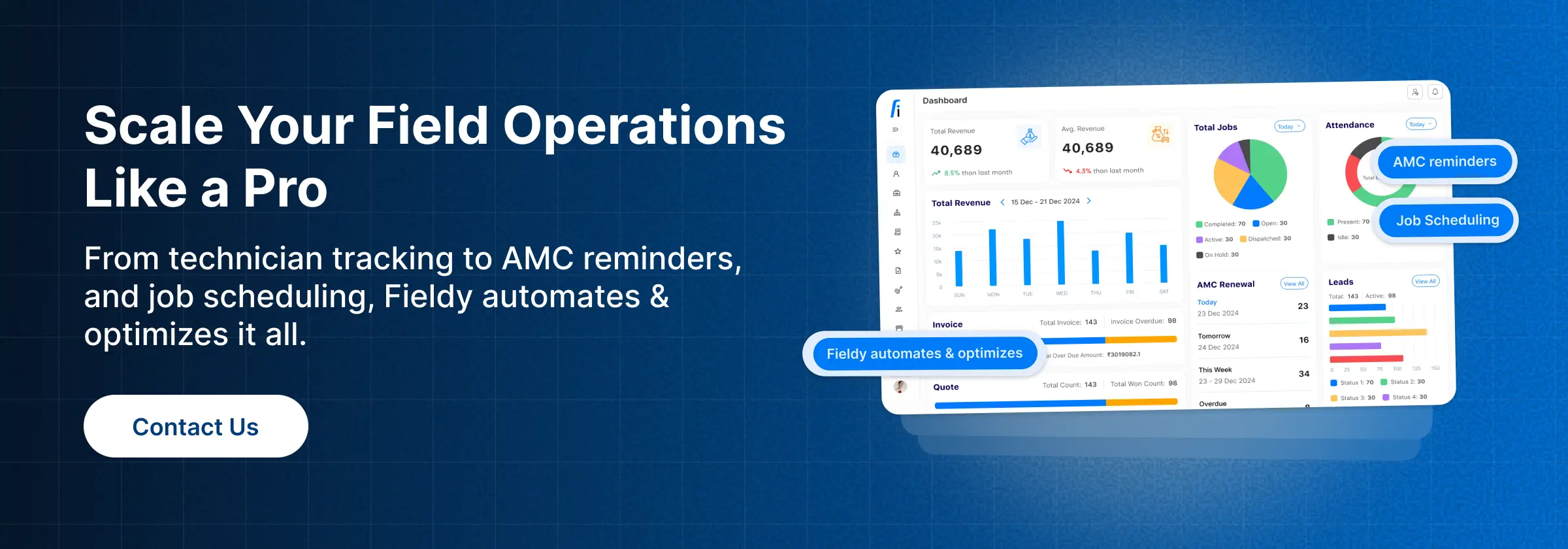The Role of Contractors in Field Service
Imagine a national HVAC company with only 20 employees on its internal payroll but hundreds of projects in numerous cities. How could this be possible? The solution is the use of contractors and subcontractors. From electrical technicians to freelance IT repair pros to plumbing subcontractors, the outsourced field forces are basically the backbone of numerous service companies nowadays.
In industries like HVAC, electrical, IT support, and facilities maintenance, contractors frequently bridge the gap between business scalability and a lean in-house workforce. In the absence of a structured system of oversight, this can pose several problems, including compliance issues, service inconsistency, and brand erosion. In essence, managing contractors has ceased to be optional and has instead become mission-critical.
For a holistic approach, check out our Field Management Software for central control.
What Is Contractor Management in Field Service?
The contractor management in field service deals with the recruitment, selection, evaluation, and vendor-provided services for third-party companies working for a contractor. These contractors can be:
- Freelance electricians addressing emergency repairs
- Regional HVAC crews taking care of seasonal maintenance
- Certain plumbing specialists for commercial sites.
The contractor is not regulated by an internal policy and employment plan but by the external agreement. Therefore, understanding what contractor management is becomes essential. It requires detailed supervision to ensure brand consistency, legal compliance, and job performance. This is where Field Service Contract Management plays a critical role, providing the structure and tools needed to manage contractor relationships effectively and align them with service expectations.
Why Is Contractor Management Important?
As field service businesses scale, reliable contractor oversight becomes necessary now more than ever. Here’s why:
Ensure Compliance and Safety
- Contractors must submit and update, on a regular basis, their licenses, insurance, safety certifications, and proof of identification.
- Background checks and training certificates safeguard safety on the job site.
- Compliance automation tools reduce the chances of facing penalties or violations on site.
Quality Control and Performance Tracking
- Set KPIs such as First-Time Fix Rate, Response Time, and Customer Satisfaction Score.
- Use mobile forms and digital checklists to record the quality of tasks and their completion.
- A central dashboard tracks historical performance and sends alerts when workforce performance starts to slip.
Better Accountability Across Distributed Teams
- Real-time job tracking allows dispatch teams to view updates, progress photos, and completion checklists.
- Geo-tagging can prove that contractors indeed were in the place they claim to be.
- Mobile apps enhance transparency through signature capture and timestamping.
The Contractor Management Process Explained
Contractor management runs the gamut from just being a basic paperwork exercise to a more strategic process that ensures third-party vendors do a consistent, compliant, and well-executed job. In the scenario of field service businesses, the effective management of external technicians or a field service engineer will indeed affect customer satisfaction and thus operational success. According to a report by Deloitte, organizations that had better contractor management systems reported 23% higher job success rate and 18% fewer compliance-related incidents.
The five key stages of contractor management in field service operations go as follows:
1. Contractor Prequalification
Why is it important:
The prequalification stage is aimed at working out whether a contractor is reliable, compliant, and skilled even before they can lay their hands on any job. Letting this pass through may in the end lead to legal consequences, shoddy work, or refusal of acceptance after inspection.
Key considerations:
- Valid licenses and certificates (electrical, plumbing, HVAC, etc.)
- Proof of insurance and bonding
- Reference checks from other clients or employers
- Familiarity with service-level agreements (SLAs), job scope, and regional regulations
How to simplify it:
Modern field service platforms like Fieldy’s FSM Software allow businesses to digitally rank and score contractors using customizable scorecards. You can automatically flag incomplete credentials, expired licenses, or poor ratings before they become operational risks.
Stat Alert: A survey by Field Service News revealed that 41% of companies experienced project delays due to hiring underqualified subcontractors.
2. Onboarding & Documentation
Why it matters:
Once contractors pass prequalification, smooth onboarding ensures they are set up with the right tools, information, and system access from day one. A delayed or disorganized onboarding process often leads to errors, billing issues, or compliance violations.
Documents & data to collect:
- Tax forms (W-9, GST, etc.)
- Signed service agreements and NDAs
- Identification documents and bank details
- Training completion certificates for safety or company tools
Best practices:
- Use e-signature-enabled onboarding flows.
- Offer role-based training modules.
- Store documents in a centralized and searchable repository.
Pro Tip:
With Vendor Contract Management Software, field service teams can automate onboarding with templated contracts and trigger alerts for missing compliance documents.
According to the Aberdeen Group, companies with automated contractor onboarding processes experience 32% faster time-to-value from new contractors.
3. Job Assignment & Monitoring
Why it matters:
A contractor with the right skills is only effective if they clearly understand what to do, where to do it, and how fast it needs to be done. Real-time coordination is key, especially when managing distributed teams across regions.
Steps involved:
- Dispatch jobs via a mobile field app
- Define clear scope of work (SOW), checklists, and deliverables
- Set estimated completion times and material requirements
- Monitor progress via GPS and real-time updates
- Enable two-way communication for queries and updates
Fieldy’s advantage:
With Fieldy, you can assign jobs using an intuitive drag-and-drop interface, send push notifications to contractors’ mobile apps, and even geo-verify arrival at the job site.
Companies using mobile FSM apps report a 27% reduction in job completion time and 35% higher SLA compliance.
4. Performance Reviews & Feedback
Why it matters:
Tracking contractor performance isn’t just about monitoring mistakes; it’s about building a data-driven contractor ecosystem where high performers are rewarded and underperformers are identified early.
Key performance metrics to track:
- Post-job customer ratings
- SLA violations (lateness, quality issues)
- Completion photos and job checklists
- Internal feedback from supervisors
Feedback loops matter:
- Contractors who consistently get 5-star ratings can be prioritized for premium jobs.
- Poor performers may be flagged for retraining or phased out.
Fieldy benefit:
You can create automated review templates, calculate performance scores, and trigger escalation workflows for non-compliance.
Businesses that regularly review contractor performance see 20% higher customer satisfaction rates, according to FSM Benchmark Reports.
5. Renewal or Termination
Why it matters:
Contractor relationships evolve. Some are long-term partners, while others may be needed only for seasonal or project-based needs. Ending or renewing contracts should be seamless, not a legal or operational burden.
Considerations for contract renewal:
- SLA adherence and job punctuality
- Cost-effectiveness compared to peers
- Positive client feedback and internal ratings
Contract Lifecycle Automation:
- Set up auto-renewal options for top-performing vendors.
- Use contract expiration alerts to avoid lapses.
- Generate digital audit trails for all decisions made.
Fieldy’s role:
Fieldy’s Contract Lifecycle Management module lets businesses manage terms, renewal dates, and compliance flags automatically.
Automating contract renewals and terminations can reduce legal overhead by up to 40%, based on a G2 report on contract management software efficiency.
How to Manage Contractors Online in Field Service
Benefits of Online Contractor Management
Modern field operations can no longer rely on spreadsheets and manual calls. Digital contractor management offers:
Real-time work visibility across multiple locations
Field service teams often operate across cities, regions, or even countries. Real-time visibility ensures managers can monitor job progress, technician availability, and resource allocation instantly, regardless of location.
This eliminates delays caused by manual updates and enables quick decision-making when schedules or priorities shift. For example, supervisors can see which field service technician is closest to a new job site and reassign tasks on the fly, improving efficiency and customer response times.
Error-free documentation with e-signatures
Manual paperwork often leads to errors, missing fields, or lost documents. By digitising documentation and enabling e-signatures, field teams can capture accurate details on-site, from job completion reports to service agreements.
This not only speeds up approval processes but also ensures compliance with industry standards and customer requirements. The result is fewer disputes, quicker invoicing, and a more professional experience for clients.
Faster onboarding with automated forms
New technicians or contractors often face lengthy onboarding processes with multiple forms and manual approvals. Automated digital forms simplify this by pre-filling standard information, guiding users through required fields, and instantly syncing data with HR or compliance systems.
This reduces administrative overhead, allows new hires to get to work faster, and ensures that all onboarding records are accurate and up to date.
Centralized dashboards for performance insights
Managing field service performance can be challenging without a unified view of data. Centralized dashboards bring together metrics like job completion rates, SLA adherence, customer feedback, and technician productivity in one place.
Managers gain actionable insights to identify bottlenecks, forecast resource needs, and improve service quality. Over time, these dashboards help align teams with business goals and drive continuous improvement.
Fieldy as an Online Contractor Management Solution
Fieldy empowers field service teams with:
Role-based mobile access for technicians and contractors
Secure mobile access ensures each team member sees only the tools and data relevant to their role. Technicians can view work orders and service manuals, while contractors access compliance documents or assigned tasks, improving focus and reducing data risks.
Job progress alerts and live location tracking
Real-time notifications keep managers updated on task status, delays, or completions. Live GPS tracking helps assign urgent jobs to the nearest technician, improving response times and operational efficiency.
Automated reminders for expiring documents or pending approvals
The system sends alerts when certifications, contracts, or work permits are nearing expiry or awaiting sign-off. This prevents compliance gaps, avoids penalties, and speeds up administrative workflows.
Real-time SLAs and contract visibility for all stakeholders
All parties, from managers to clients, can monitor SLA timelines and contract obligations in real time through a centralized Field Service Contract Management page. This transparency reduces disputes, ensures timely service delivery, and strengthens client trust.
Tools to Support Effective Contractor Management
When exploring how to manage contractors effectively in 2026, field service companies should prioritise the following tech features:
Mobile Accessibility
Mobile-friendly platforms allow contractors to view schedules, upload site photos, and log job progress directly from their devices. This ensures real-time updates without the need for manual reporting.
Offline mode is equally vital, enabling technicians to continue working in areas with low or no connectivity. Tracking these activities feeds into the KPIs, helping managers assess productivity and response times across distributed teams.
Job Costing and Invoicing
By linking service contracts with time logs and material usage, the system provides accurate job costing in real time. Auto-filled invoices reduce manual errors and speed up billing cycles.
These cost insights also contribute to Field Service KPIs and Metrics, enabling businesses to monitor profitability per job, track revenue leakages, and improve financial planning.
Compliance Workflows
Automatic alerts for expiring insurance, certifications, or safety training keep contractors compliant without manual follow-ups. Compliance-based scorecards can be assigned to evaluate contractor readiness and adherence to safety standards.
Monitoring these compliance scores also becomes an intergral part of Metrics & measurable KPIs, ensuring service quality and regulatory alignment for field service management.
Final Thoughts
Scale Contractor Operations with Smart Management
In a service landscape where 62% of businesses now rely on third-party technicians, building a scalable contractor management process is essential to stay competitive.
Digital platforms like Fieldy are no longer a luxury but a necessity. With automated workflows, performance dashboards, and compliance controls, Fieldy ensures that your contractor operations are seamless, transparent, and growth-ready.
Ready to streamline contractor operations? Discover Fieldy’s Contract Management Tools today.
FAQs:
What does contractor management mean in field service?
A: The term contractor management means administering third-party professionals who carry out service jobs for your company. Onboarding, job tracking, compliance, and performance reviews are ensured for maintaining the brand standards and service quality.
How do field service companies determine the compliance of contractors?
A: By collecting the requisite license, safety certificate, and insurance documents. Fieldy automatically tracks compliance and alerts when documents are nearing expiry, with customizable checklists with varying levels of granularity.
Is it possible to check contractor performance at the moment?
A: Yes. With contractor management software, mobile applications, GPS, time logs, or progress checklists, contractors are observed on the go. Such visibility guarantees on-time delivery and full accountability.
Why is online contractor management better than manual processes?
A: Online tools cut paperwork, lead to fewer errors, and give instant visibility into contractors’ activities. They’re also great for almost every process — they support faster onboarding, automated billing, and SLA-based contract renewals.
What features should I look for in contractor management software?
A: Look for tools with mobile accessibility, compliance tracking, job assignment automation, performance analytics, and integrated invoicing. Modularity is also key for growing teams.




